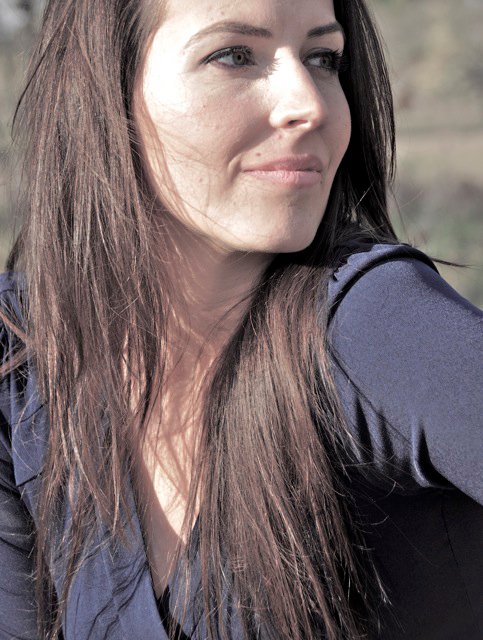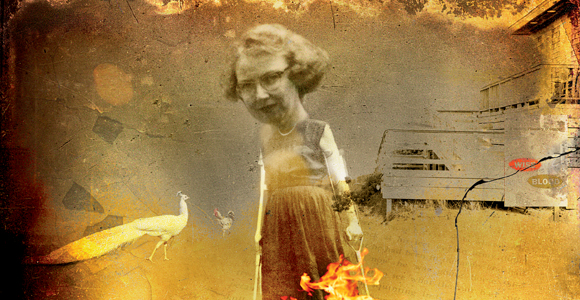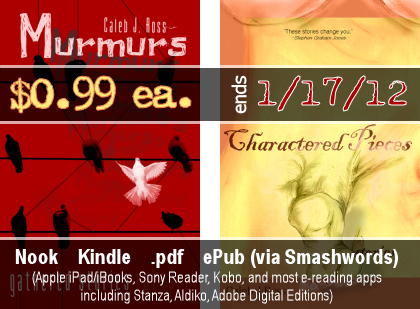In the world of grotesque fiction, Flannery O'Connor is the go-to mouth to voice what's worth our academic time and what's worth ignoring. Knowing my love of the grotesque and my respect for Flannery O'Connor, Richard Thomas passed along a copy of O'Connor's important "Some Aspects of the Grotesque in Southern Fiction" (1960) which somehow I had never read before. I'm glad I have now rectified that problem. Below are a few choice quotes, words I'm sure I will cite for the rest of my writing career, especially when citing my own grotesque fiction. On mystery as motivation ...if the writer believes that our life is and will remain essentially mysterious, if he looks upon us as beings existing in a created order to whose laws we freely respond, then what he sees on the surface will be of interest to him only as he can go through it into an experience of mystery…
Tag Archives CHARACTERED PIECES
All eBook versions of either Charactered Pieces or Murmurs: Gathered Stories Vol. One are only $0.99 from now through January 17th. Why January 17th? Because that is the official release date for my newest novel, I Didn't Mean to be Kevin. Just click a link below to go either directly to the Amazon Kindle store or to the Smashwords pages where other formats can be purchased (including NOOK, Sony, Kobo, iBooks, etc.) Please, spread the word if you are willing and able. This is a damn fine deal, I must say, and is a great opportunity to whet your appetite for the upcoming I Didn't Mean to be Kevin.
 (part of my ongoing Search Engine Optimization for Authors series[ref]I understand that paid search ads aren’t traditionally umbrellaed under search engine optimization. However, because tracking and optimization is involved, I’m including it in the series[/ref])
Part of being a great author-marketer is knowing how to filter promotion time wastes from time worthwhiles. Some options are simple to filter. “Should I do a Goodreads.com giveaway to attract potential readers?” Yes (all it costs is the price of a few copies of a book to receive interest from hundreds of readers). “Should I rent a billboard for a month?” No (billboards offer either 1) travel-oriented products/services or 2) products with a high profit margin). Some options aren’t so simple. And in the case of the Facebook ad, prominence adds to the should I or shouldn’t I debate. Well, I’m here to help.
(part of my ongoing Search Engine Optimization for Authors series[ref]I understand that paid search ads aren’t traditionally umbrellaed under search engine optimization. However, because tracking and optimization is involved, I’m including it in the series[/ref])
Part of being a great author-marketer is knowing how to filter promotion time wastes from time worthwhiles. Some options are simple to filter. “Should I do a Goodreads.com giveaway to attract potential readers?” Yes (all it costs is the price of a few copies of a book to receive interest from hundreds of readers). “Should I rent a billboard for a month?” No (billboards offer either 1) travel-oriented products/services or 2) products with a high profit margin). Some options aren’t so simple. And in the case of the Facebook ad, prominence adds to the should I or shouldn’t I debate. Well, I’m here to help.
I write domestic grotesque fiction, which is a term I think I made up, but is quite suiting to the themes and content of my stories and books. The most famous short story that I think would fit into the domestic grotesque genre is “Good Country People” by Flannery O’Conner (visualized quite creepily in this short film from the 1960s and quite cheesily in this student clip). Take a family situation—usually some sort of broken family dynamic—mix in something grotesque—possibly morbid but not necessarily—and you’ve probably got domestic grotesque. As you can imagine, Christmas is a fun time for my family. I’ve given quite a few quirky gifts. Though none could be tagged as grotesque, they are representative of the type of mind that would write a domestic grotesque story, I think. Tis the season and all that, so I figured I would share a few that I’ve so graciously…
Nathan Pettigrew, one of the two minds behind the lit site Solarcide, asked me for an interview a few days ago. This guy knows how to ask questions, ones that not only evoke my own passion for the subject matter but also make it easy for me to answer in a way that is hopefully entertaining for readers. Head over to Solarcide now. Read the interview. Learn of my greatness. Here's a taste of Nathan's humbling intro: He’s one of literature’s most lethal rising stars and highly prolific with not one, but four new releases in 2011. His debut novel from earlier this year, Stranger Will (Otherworld Publications), established Caleb J. Ross as a true talent to be reckoned with. His writing can be described as stylistically beautiful while depicting some of the darkest and most disturbing worlds that fiction has to offer. Picking up on concurrent themes throughout his work pertaining…
Music and creative writing have always coexisted for me. Not only do I write to music and edit to music, but now, music has been written to me. Confused? Be confused no more. Today at the Metazen blog I compare my story "My Family's Rule" to the song, "Saint Thomas," by the Tulsa, OK band Cecada. Click here to read the guest post. Also, don’t forget that if you comment on all guest blog posts, you will get free stuff.
What follows is a conversation between myself and writer and Warmed and Bound editor, Pela Via. Why? We like chatting about ourselves. Or, read a much prettier version at Pela's blog.
 |
 |
Pela Via: Thanks for talking to me again, Caleb. You are one of the hardest workers in contemporary fiction; I always love a chance to corner you into a long, stifling conversation. Are you as prolific as you seem?
Caleb J. Ross: Prolific is a term that seems appropriate at first, but really a better way to say it would be "got lucky all at once." Stranger Will and I Didn’t Mean to be Kevin, the two 2011 novels, were both written a few years ago, each a year or so apart. And the novella also to be released this year, As a Machine and Parts, was written even later than the novels. This is all to say that I spent about eight years writing the books, but the one year release schedule implies otherwise. I'm actually quite the disappointment.
PV: Hardly. Your short work is everywhere. Do you plan to release any books in 2012?
CJR: As for 2012, nothing is contracted yet. But I have plenty to write.
PV: What do these two novels represent in your writing career?
CJR: The books both deal with parenthood, but from opposite angles. Stranger Will is about a parent not wanting his child. IDMtbK is about a child wanting nothing more than to have a parent. IDMtbK was written later, and I see it as a reaction to Stranger Will; it is both a personal goal (as in "now, let me see if I can to the opposite of what I just did") and a reader-based goal (as in "I had better show readers that I'm not as crazy as Stranger Will would imply").
PV: Do you feel more official this year, as a writer? I know it's not your first book, but Stranger Will is your first published novel. Has it helped your ego?
CJR: The ego has taken a bit of a stroke, for sure. What makes me feel the most validated with Stranger Will is that I have a lot of strangers commenting on the book. With Charactered Pieces, my first book, I would say about 70% of the readers knew me personally. With Stranger Will that number seems significantly different.
PV: I'm frightened of reaching that place where my work is just barely popular enough to be reviewed by non-friends (and consequently panned).
CJR: I wouldn't worry about having strangers review your work. I've found that the panning is about the same with strangers and friends. The difference being that friends tend to critique you as a person along with the work ("Wow, I can't imagine you writing something like this") whereas strangers tend to focus on the work itself.
PV: Interesting. So does it sting a bit more, then, when it comes from friends, if they have a complaint? Does it feel like they're speaking to your general ability as a human and writer?
CJR: Most of my friends who read early drafts are writers themselves, so I understand that all intentions are good. That said, it can still sting. But the sting is more because of my passion for the work rather than my relationship to the reader.



